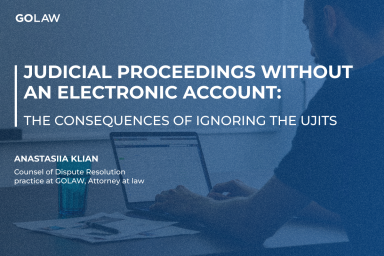How banks should avoid risks when refusing to provide services to the client
Enhancing the financial monitoring has significantly impacted the relations between banks and customers of banking services. Sometimes the banks’ refusal to serve clients will become subject to challenge in court.
The Supreme Court’s attitude to this issue is currently unambiguous: the right of the banks to deny cooperation with a client is not absolute, while the Law “On Preventing and Counteracting to Legalization (Anti-Money Laundering) of Proceeds of Crime, Terrorism Financing and Financing the Proliferation of Weapons of Mass Destruction” obliges the banks to properly conduct the KYC procedure and verify their financial transactions.
Should certain risks be verified, the bank is not only in a position to, but also is obliged to refuse to continue business relations with a client or to conduct a suspicious financial transaction. Actions of the bank following such verification are often challenged by clients who, for example, have been denied opening an account or cash withdrawal.
In any case, the risk assessment should be impartial and be based on the criteria developed by the bank.
Since the banks are liable not only for the improperly conducted assessment of financial transaction risks, but also for the infringement of clients’ rights.
The bank’s right to deny cooperation with a Client is not absolute, which is confirmed by the case-law at the Supreme Court level.
In cases No. 910/3245/19 and No. 910/507/20, the Supreme Court stated that the bank as a primary financial monitoring entity did not have an unlimited right to terminate a bank account agreement due to assigning an unreasonably high risk to a client. In order to confirm the lawful nature of their actions, the banks must provide a court with their own financial monitoring compliance risk management programs containing relevant criteria.
However, the internal documents of the banks related to financial monitoring are restricted documents.
According to the Supreme Court’s attitude set forth in case No. 910/11471/17, the bank is not obliged to make the internal documents, including those containing the risk criteria, available to clients for review.
Thus, how can the bank substantiate its refusal to provide services to a client? On the one hand, if the bank discloses the criteria of refusal, it will make it easier to conduct unlawful transactions by mala fide clients. On the other hand, termination of business relations should not be an uncontrolled matter and should be based on the detailed risk criteria. Nowadays, this issue is debatable.
However, if court proceedings are commenced, the bank should prove proper compliance with all internal and legislative procedures related to the refusal to provide services. Otherwise, the bank will face rather adverse consequences, including the default charge in favor of consumers of banking services.
This is because the Law “On the Protection of Consumers’ Rights” applies to the banks: if a bank delays to provide the services under an agreement, it shall pay a customer the late performance fees in the amount of three percent of the cost of services for each day of delay.
If the cost of the service is not determined, a bank shall pay a customer a penalty of three percent of the total cost of an order. The delay shall mean a refusal of the bank to perform a client’s instruction or a late fulfilment of a certain transaction.
However, there is an issue that neither the legislation, nor the case-law provides an answer to the question: how is the base for the default charge calculation to be determined if the cost of a banking service is not determined? For example, the banks often do not charge the services for cash withdrawal from the client’s account.
In case No. 761/26293/16-ц, the Grand Chamber of the Supreme Court emphasized that when the cost of a service is not determined, the penalty shall be calculated based on the amount of funds on client’s account. As a result, the court awarded a penalty for the bank’s refusal to fulfil the client’s instruction regarding the cash withdrawal under a bank account agreement in the amount of 3% of the funds deposited on such an account for each day of delay from the client’s relevant request until the actual withdrawal date.
Since the Supreme Court’s rulings are binding upon courts of the lower instances, it has led to formation of extremely inconsistent case-law on charging the excessive amounts of penalty from banks in comparison with 3% per annum and inflation losses under Article 625 of the Civil Code of Ukraine.
The specified resolution of a cassation court caused the increase in the number of claims against banks, including those filed by mala fide users of banking services. There are common cases when a penaty charged from banks exponentially exceeds the amount of funds on clients’ accounts. Such an approach creates significant risks for sustainable functioning of the banking system and options for the unlawful enrichment of a significant number of clients.
The inconsistency and inadequacy of the specified approach to calculating the amount of the penalty was emphasized by the Cassation Court in case No. 320/5115/17.
The Court stated that since the funds on clients’ accounts were to be returned to customers in any case, and not to remain with the bank as payment for its services, they could not be the basis for calculating the penalty amount pursuant to part 5 of Article 10 of the Law “On the Protection of Consumers’ Rights”.
In this regard, the Supreme Court referred case No. 320/5115/17 to the Grand Chamber of the Supreme Court for consideration to resolve the exclusive legal issue concerning the scope of bank’s liability. The issue is to determine the cost of services subject to the penalty calculation.
Case No. 320/5115/17 is currently pending the final court’s decision. As a result, the banks are still under the threat of unjustified and inadequate claims of customers of banking services.
In some cases, the courts also refer to the general principles of civil law provisions, in particular, to the principles of justice, fairness and reasonableness. Based on the provisions of the Civil Code of Ukraine, the amount of a default charge, which significantly exceeds the amount of losses, may be reduced by a court’s decision. In such a case, the amount of a penalty is usually reduced to the amount of funds credited on the client’s account. It is confirmed by the case-law of the Supreme Court, inter alia, in cases No. 367/1260/19 and No. 758/10471/15-ц.
Therefore, the cost of a mistake when denying the provision of services to a client may be the default charge under the Law “On the Protection of Consumers’ Rights”. Given the ambiguous case-law, the amount of such penalty can significantly exceed the amount of outstanding cash commitment. Thus, while conducting the financial monitoring the banks should more carefully comply with all rules and procedures stipulated by the legislation and internal documents of banks.

Kateryna Manoylenko
Partner, Head of Litigation and Dispute Resolution practice, Attorney at law
- Contacts
- 31/33 Kniaziv Ostrozkykh St, Zorianyi Business Center, Kyiv, Ukraine, 01010
- k.manoylenko@golaw.ua
- +380 44 581 1220
- Recognitions
- The Legal 500 EMEA 2024
- Who's Who Legal 2022 - 2024
Sign up to be aware
New achievements are inspired by information. GO further, don’t miss out GOLAW news and legal alerts
Our expertise
-
- Antitrust and Competition
- Banking and Finance
- Compliance, Corporate Governance and Risk Management
- Corporate and M&A
- Criminal and White Collar Defence
- Defense in Anti-corruption procedures and regulations
- Labor and Employment
- Natural Resources and Environment
- Government Relations (GR)
- Insolvency and Corporate Recovery
- Intellectual property
- International trade
- Legal support of business and private Сlients in Germany
- Litigation and dispute resolution
- Private clients
- Real Estate and Construction
- Energy and Natural Resources
- Restructuring, Claims and Recoveries
- Martial Law
- Tax and Customs
-
- Agribusiness
- Aviation
- Chemical industry
- Engineering, Construction and Building Materials
- Natural Resources and Environment
- Financial institutions
- IT and AI
- Industry and manufacturing
- Healthcare industries, Life sciences and Pharmaceuticals
- Media, Entertainment, Sports and Gambling
- Retail, FMCG and E-Commerce
- Transport and Logistics
We use cookies to improve performance of our website and your user experience.
Cookies policy
Cookies settings







